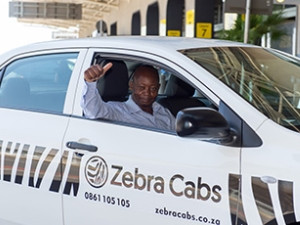
Uber rival SA Taxi today announced it has secured R300 million in funding from Futuregrowth Asset Management, which will be used to provide financing to the company's Zebra Cabs owner-driver scheme.
SA Taxi, the country's largest financier of minibus taxis, acquired Zebra Cabs metered taxis in 2015 as the certified developmental credit provider sought to expand its business activities into relevant adjacent markets.
The local metered taxi industry is facing stiff competition from ride-hailing app Uber since its entrance into the market in September 2013. Uber now has thousands of drivers operating in SA.
Feeling the heat, in October, the metered taxi industry filed a complaint with the Competition Commission claiming Uber floods the market with vehicles because it does not have to comply with licensing and other public transport regulations and that it charges prices that are below costs.
However, the commission took a decision not to prosecute a complaint filed by the metered taxi industry against Uber.
Mark Herskovits, SA Taxi capital markets director, explains that after 10 years in the minibus taxi industry, the company has been looking for opportunities to leverage its business model and underlying operational efficiencies, and determined that the point-to-point metered taxi industry offered the ideal synergies to scale effectively.
"We have developed a business model tailored to the unique characteristics of an industry often perceived as higher risk," explains Herskovits, who elaborates that SA Taxi considers credit extension to owner-drivers, or operators, as a small business loan rather than a personal loan.
"This differentiates us from the vanilla financing options offered through banks, which focus mainly on the creditworthiness of the individual. This often precludes these previously disadvantaged individuals from accessing the finance needed to build a profitable small business."
With key similarities between the factors driving the need for finance in the mini bus and metered taxi industries, SA Taxi believes this is a natural extension of the business and therefore an ideal area for growth.
"These two sectors don't compete directly which makes it an ideal bolt-on business," says Herskovits.
SA Taxi says it will now leverage the company's vertically integrated and successful minibus taxi business model to revive the floundering metered taxi cab industry.
"In South Africa, the industry is characterised by an old, poorly maintained fleet of vehicles and a lack of trust and transparency in pricing. We therefore feel there is an opportunity to revolutionise the industry and also offer a suitable alternative to Uber, which is doing a great job at disrupting this sector," says Herskovits.
SA Taxi, in conjunction with Futuregrowth, are therefore offering owner-driver entrepreneurs who don't want to operate mini buses and who may not have a credit record that enables them to access vehicle financing, the means to purchase a metered taxi, along with additional support in running their small business.
"As a long-standing investor in SA Taxi, on behalf of our clients, we have witnessed how the company has become a pioneer of innovation in an industry that poses many challenges," says Gershwin Long, investment analyst at Futuregrowth.
"Add to this the established relationships held with industry regulators, and the company's credit vetting and rating processes, and we have every confidence in the business, the business model and the management team. This leaves us with no doubt that the company will be able to revolutionise the metered taxi industry in the same manner, thereby offering a sound investment opportunity."
Long says this innovation is already evident in the manner in which SA Taxi has overhauled and modernised operations.
"Our research shows that the average age of the metered taxi fleet in South Africa is five years, which impacts profitability of metered taxi operators. However, SA Taxi has upgraded the Zebra Cabs fleet with just under 300 Toyota Corollas, all equipped with GPS, Bluetooth, leather seats and external cameras."
In addition, customers now also have a choice of mechanisms to book a taxi, either through the traditional call centre or hailing options, or via an app or Web portal. Various payment methods are also available, including cash, cards or mobile e-wallet transactions.
"This differentiates the operation from Uber," says Herskovits, who adds the company has also partnered with numerous corporates in Johannesburg to meet their transport needs on a contract basis, securing a presence in a big market within which Uber can't compete.
According to Long, all of these elements help owner-drivers to be more efficient and profitable, which makes it more likely SA Taxi will recoup loans and make a profit. "From a lender's perspective, this ensures a significant degree of loan protection and delivers a strong return."
Long also explains that Futuregrowth is dedicated to the development and empowerment of SA and its people, and continually looks for investment opportunities that deliver sustainable returns, and social and economic benefits. "This investment fits our developmental mandate perfectly since it has the potential to uplift these entrepreneurs and their families and is good for the local economy, too," he says.
This initial funding is earmarked for expansion over a two-year period, with a primary focus on operations in Johannesburg. "We will consider seeking additional funding sooner if required, but we first want to build scale in the key area of Johannesburg to achieve critical mass, before expanding operations to Cape Town and Durban. Our long-term goal is to have 3 000 Zebra Cabs on the road by 2020," concludes Herskovits.
Share